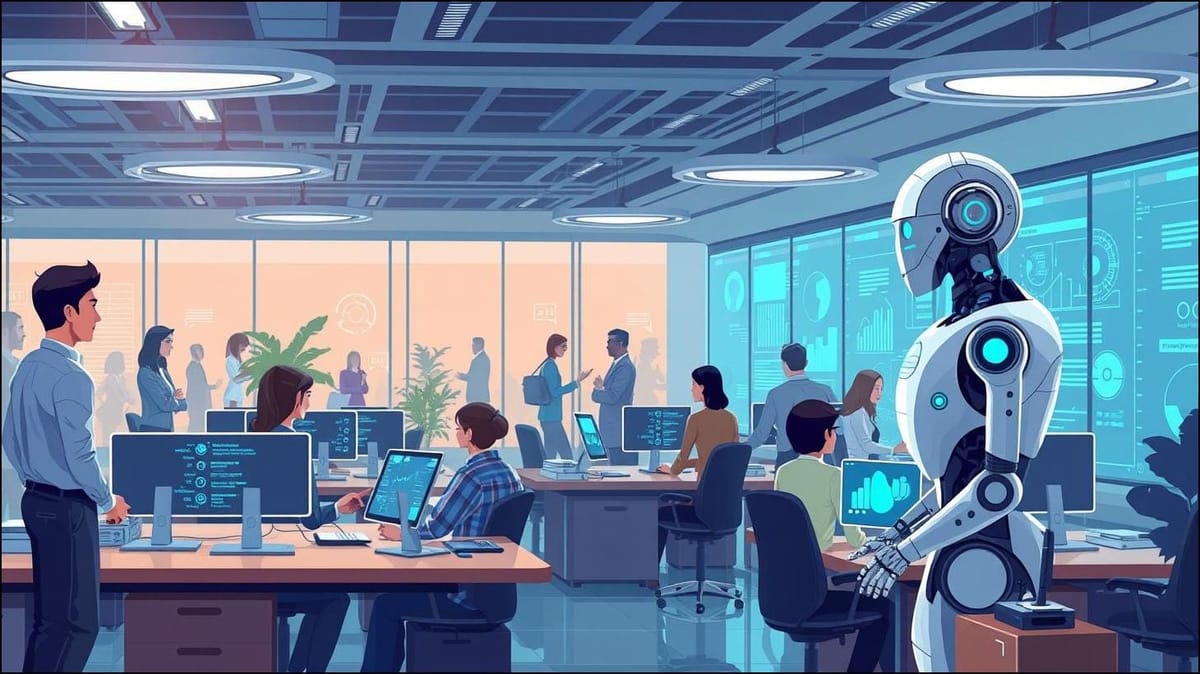Revolutionizing the Workplace: The AI Power Boost for Productivity

Harnessing AI for Workplace Productivity
In a rapidly evolving digital age, boosting workplace productivity through Artificial Intelligence (AI) is paramount. Organizations are actively integrating AI technologies to revolutionize their operations, foster greater efficiency, and significantly enhance employee satisfaction. From automating mundane tasks to empowering data-driven decision-making and supporting hybrid work environments, AI is redefining the modern workplace landscape. This article delves into the multifaceted ways AI is transforming businesses and explores future trends shaping how we work. Join us on this journey to understand the pivotal role AI plays in driving productivity and operational excellence.
Automating Mundane Tasks
AI's capacity for automating mundane tasks is nothing short of revolutionary. By relieving employees from repetitive duties such as data entry, scheduling, and inventory management, businesses are not only enhancing productivity but are also enabling their workforce to engage in more strategic and creative endeavors. Take, for instance, an insurance company that utilized AI algorithms to process claims, cutting down the average processing time from days to mere hours. This shift not only lightened the load for claims adjusters but also enhanced customer satisfaction significantly, proving that happy employees often equate to happy customers.
However, transitioning to automated systems can often ignite resistance among employees who fear job security may be threatened. Companies can adopt an inclusive approach by offering training sessions to upskill employees, thereby helping them adapt seamlessly to this new landscape. As organizations embrace AI-driven automation, balancing technology with a human-centered approach is key, ensuring that the workforce evolves alongside these advancements, resulting in a truly transformative work environment.
Data-Driven Decision Making
In the fast-paced business landscape, AI analytics is revolutionizing the decision-making process by transforming vast amounts of data into actionable insights. Organizations harnessing AI effectively translate raw information into informed strategies, promoting smarter operations and significantly enhancing customer experiences. For instance, companies like Netflix utilize AI algorithms to personalize content recommendations, boosting user engagement and satisfaction [Source: Harvard Business Review].
However, implementing AI analytics poses challenges, particularly concerning data privacy and security. As businesses increasingly rely on data-driven insights, they must navigate regulations such as GDPR, balancing innovation with compliance. This necessity has led to innovative approaches to enhance data security, leveraging techniques like differential privacy to protect individual data while still deriving valuable insights [Source: Forbes]. Moreover, it's not just about the data collected; it's also about how it's synthesized. Tools leveraging machine learning analyze historical data to predict future trends, allowing companies to allocate resources more effectively. This strategic advantage is particularly evident in supply chain management, where AI optimizes inventory levels, reducing costs while meeting customer demand [Source: McKinsey & Company].
AI-Powered Employee Support Systems
AI-driven chatbots and virtual assistants are changing the way organizations support their employees, enhancing engagement and satisfaction levels across various sectors. By providing instantaneous responses and assistance, these AI systems alleviate the weight of mundane inquiries and administrative tasks from human staff. For example, IBM’s Watson has been successfully integrated into employee support systems, allowing workers to access HR information, benefits, and policies without waiting for a representative, thus streamlining operations and minimizing response times.
Furthermore, companies like Unilever have leveraged AI chatbots to facilitate onboarding processes and answer employees’ common questions, leading to a smoother transition for new hires. By automating these support functions, organizations can redirect human resources toward more strategic initiatives, fostering an environment of creativity and innovation. The data-driven nature of these AI applications also enables ongoing tweaks and improvements to systems, ensuring they evolve in tandem with employee needs. However, successful integration hinges on thoughtful planning and change management to overcome potential resistance from staff wary of AI.
Navigating Hybrid Work Environments with AI
The hybrid work environment balances flexibility and productivity, and AI facilitates smooth collaboration between remote and in-office teams. Cutting-edge platforms like Zoom and Microsoft Teams have incorporated AI features to enhance communication, making scheduling easier with smart assistants and improving video quality through intelligent adjustments. Furthermore, AI-driven analytics tools can monitor engagement levels during meetings, providing insights to improve future interactions. Companies such as Unilever and Siemens are already experiencing these benefits, demonstrating that AI can transform how teams interact, regardless of their physical locations. Deploying these tools, however, requires addressing integration issues and possible resistance from employees wary of change. AI's role in perfecting hybrid dynamics is undeniable, yet proper management strategies are critical to success.
Conclusions
AI is a game-changer in shaping productive and efficient workplaces. It frees up valuable human resources by automating mundane tasks, drives insightful decision-making through data analytics, and improves employee satisfaction via AI-powered support systems. As organizations navigate hybrid work arrangements and sector-specific challenges, AI's adaptability shines through. Looking ahead, businesses must embrace emerging technologies and strategic AI implementations for sustainable growth. The future of work is undoubtedly AI-enhanced, promising unprecedented productivity improvements across industries.